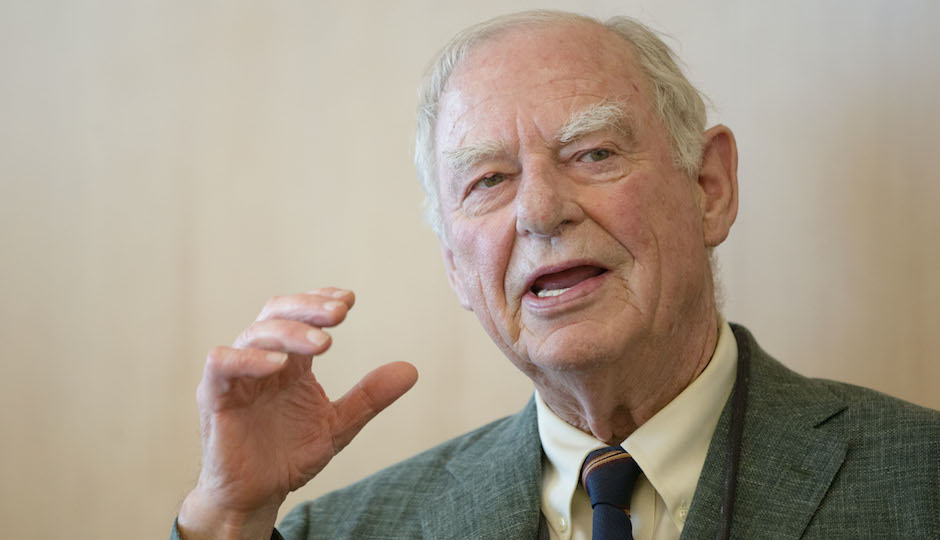The Inquirer Endorses Nobody for Governor

Philanthropist H.G. “Gerry” Lenfest speaks at a news conference after a closed-door auction to buy the The Philadelphia Inquirer and Philadelphia Daily News Tuesday, May 27, 2014, in Philadelphia. Photo | AP, Matt Rourke
And in the 2014 Pennsylvania governor’s race, the Philadelphia Inquirer endorses … nobody. Absolutely nobody.
Readers on Sunday were instead treated to a list comparing and contrasting the major positions of Gov. Tom Corbett and challenger Tom Wolf — something that mostly could and should run in the paper’s news pages — but without any kind of weigh-the-facts-and-make-a-recommendation conclusion at the end of it that you’d expect from the op-ed page of the region’s biggest news operation. (A similar grid ran in Friday’s Daily News.) Instead, we got a column from owner/publisher Gerry Lenfest explaining the effort as a kind of high-minded bit of innovation.
“Instead of an endorsement for governor, I asked the editorial boards of both the Inquirer and the Daily News to provide a summary of where the candidates stand on the critical issues facing the state, as well as the positions each paper has taken on those issues, and then let the voters decide who they think is most qualified,” Lenfest wrote. “My aim is simple: to help people make informed decisions about their vote. We will still endorse certain candidates in the future.”
There had been whispers emanating for several weeks from the Inquirer’s Market Street headquarters suggesting the paper might end up with a non-endorsement in the governor’s race — though instead of painting the decision as an experiment, the whisperers usually pointed to the fact that Lenfest was one of this year’s biggest donors to the campaign of Tom Corbett, having given $252,000 to the incumbent. (Lenfest has publicly said he made the donation because Corbett steered $30 million in state funds to the Museum of the American Revolution, of which he is chairman.)
Officially, though, the Inquirer is buttoned-up on the matter. I emailed Harold Jackson, the Inquirer’s op-ed editor, a couple of weeks ago about the possible non-endorsement — asking if the Inquirer had ever sat out a major election before, and asking him to describe the process that led to this decision. I received, in turn, an email from company spokesman Jonathan Tevis telling me there would be no comment on the matter.
So there’s that. Here’s the important question: Does this even matter?
One the one hand, the Inky’s non-endorsement isn’t that big a deal. There’s a ton of evidence that newspaper endorsements in big political races just don’t make a difference — or if they do, it’s at the margins. There’s reason to believe that endorsements end up angering more readers than they actually persuade, and the Inquirer’s not really in a position these days to run around alienating its dwindling audience.
By sitting out the election, in other words, the Inquirer is probably affecting the outcome as much as it would’ve by making an endorsement. Why go to the trouble?
On the other hand, the non-endorsement is a very big deal indeed: It goes to the heart of how the paper sees itself as an institution, and how it presents itself to the community.
Understand, one of the underlying arguments in the recent ownership dispute that led to Inky editor Bill Marimow’s firing and restoration — followed by the ascension of Lenfest to sole ownership of the papers — was about the paper’s opinion pages. Then-majority owner George Norcross reportedly ordered the pages cut from two to one on weekdays. (Jackson reportedly let contributors know the cut diminished not just the opinion section, but also the entire city of Philadelphia.) When Norcross lost the bidding for the newspapers earlier this year, the Inquirer almost immediately — even defiantly — restored the second opinion page.
Message: The Inquirer’s opinions — the ones it generates and the ones it hosts — matter.
That was just a few months ago. Now comes the biggest political decision of the year, and the Inquirer essentially takes a pass.
That sends the opposite message.
Here’s the shame of it: The challenges facing the Inquirer and Daily News still exist — we’ll find out the latest circulation numbers this week — but the accidental leadership of Gerry Lenfest appears to have stabilized the company in important respects. The decision to drop the Inky and Daily News websites, for example, represents an effort to focus on and build the company where it’s strong. The growth of the Sunday features section at the Inquirer does the same. By all accounts, too, Stan Wischnowski, the new vice president for news operations, has done an admirable job getting the Inquirer, Daily News, and Philly.com to row in the same direction. If you’re a fan of the newspapers and believe their work is important, all of this should be encouraging.
The latest development isn’t.
Through all the battles — of owners, against bankruptcy, and with each other — of recent years, the Inquirer and its journalists have persistently strived to maintain a reputation as a strong, independent voice in the city. Sunday’s non-endorsement undermines that effort. Sometimes it’s better to take a stand.
Follow @JoelMMathis on Twitter.


